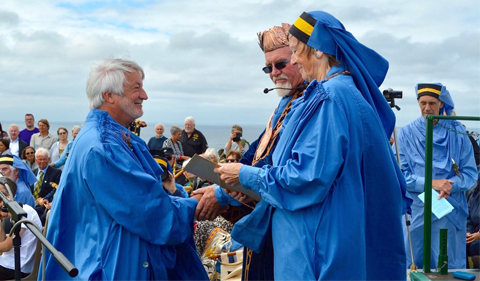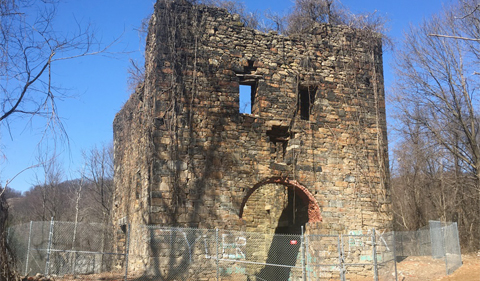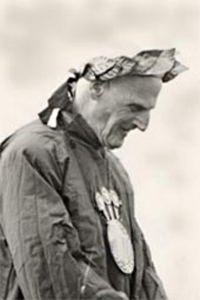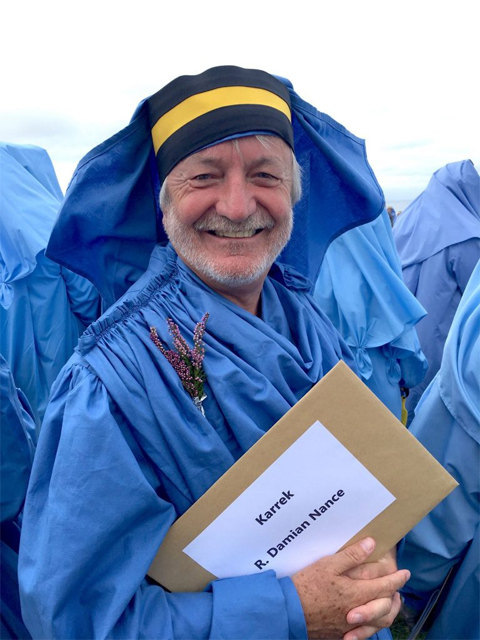
R. Damian Nance is welcomed into the College of Bards and given his bardic name by the Grand Bard of Cornwall “Yn lowen ni a’th tegemmer Karrek yn mysk Berdh Gorsedh Kernow” (We gladly admit you, Karrek, among the Bards of the Cornish Gorsedh)
On the first day of September, in a field of ancient Celtic barrows on the wind-swept north coast of Arthurian Cornwall, Dr. Damian Nance, Distinguished Professor Emeritus of Geological Sciences, was named a Bard of the Gorsedh Kernow, which loosely translates as the “throne” or “high seat” of the Celtic county of Cornwall (UK).
It is the highest honor this ancient Celtic nation can bestow upon its people.
Every year for the past 90 years, the Gorsedh Kernow has held its Esedhvos Festival of Cornish Culture, a gala event that includes an impressive ceremony during which new bards robed in blue are hooded and named before all the bards of Cornwall arranged in a blue circle around them amid a host of colorful banners. Like the Eisteddfod in Wales and the Gorsedd in the kindred Celtic region of Brittany in France, the Cornish Gorsedh (pronounced “gorseth”) was established to give expression to the national spirit of Cornwall and preserve the language, history and culture of its people; a role first played in ancient Celtic countries by the storytellers or Bards.
Bards are elected in secret by the Gorsedh Council and awarded to people who, in their view, have given exceptional service to Cornwall. While Cornwall is known world-over for the extraordinary variety of its minerals, Nance was not chosen for his successful academic career in geology, although his work on Cornish geology was cited and his bardic name is Karrek (meaning “rock”). Nor was he specifically chosen for his work on Cornish mining history, although he has written three books on the subject. Instead, he was honored for his service to Cornish identity in the U.S.A. And herein lies a story.

House of “The President”, a massive (110-inch cylinder) steam pumping engine built in 1872 for Lehigh Zinc Company’s Ueberroth Mine in Friedensville, Pennsylvania
In addition to his pioneering research in geology, Nance is an authority on Cornwall’s historic contribution to steam engine development and, in this connection, has published many papers on steam power in the Americas that spotlight the pivotal role of 19th century Cornish technology in the growth of this country.
He also has drawn public awareness, with a view to its preservation, to America’s last surviving Cornish pumping engine house. Erected in 1872 to serve the Lehigh Zinc Co.’s Ueberroth Mine near Friedensville, Pa., this building once housed a truly massive steam engine known as “The President.” Designed by Cornishman John West to pump at the then staggering rate of 15,000 gallons per minute, it was the largest steam engine ever built on this side of the Atlantic with a cylinder diameter of more than none feet, twin walking beams, and a pair of massive flywheels each weighing in at 75 tons.
With colleague Mark Connors, Nance is playing a central role in an ongoing effort with Lehigh University (on whose property it lies) to stabilize the engine house and use it as the centerpiece of an outdoor museum and heritage park that will celebrate the role of the Cornish in America. It was this activity that drew the attention of the Gorsedh Council and resulted in his nomination to Cornwall’s prestigious College of Bards.
Quite by chance, Nance’s brother Jonny also was admitted to the College of Bards at the same ceremony, in his case for outstanding service to Cornish maritime culture as a builder of traditional Cornish sailing boats and regatta organizer for the harbor town of St. Ives, where both brothers grew up.
So this year’s Gorsedh Kernow was a Nance family affair made all the more poignant by the fact that, with their induction, the two brothers became Cornwall’s first third-generation bards; their father, grandmother and both grandfathers having been honored before them.




















Comments